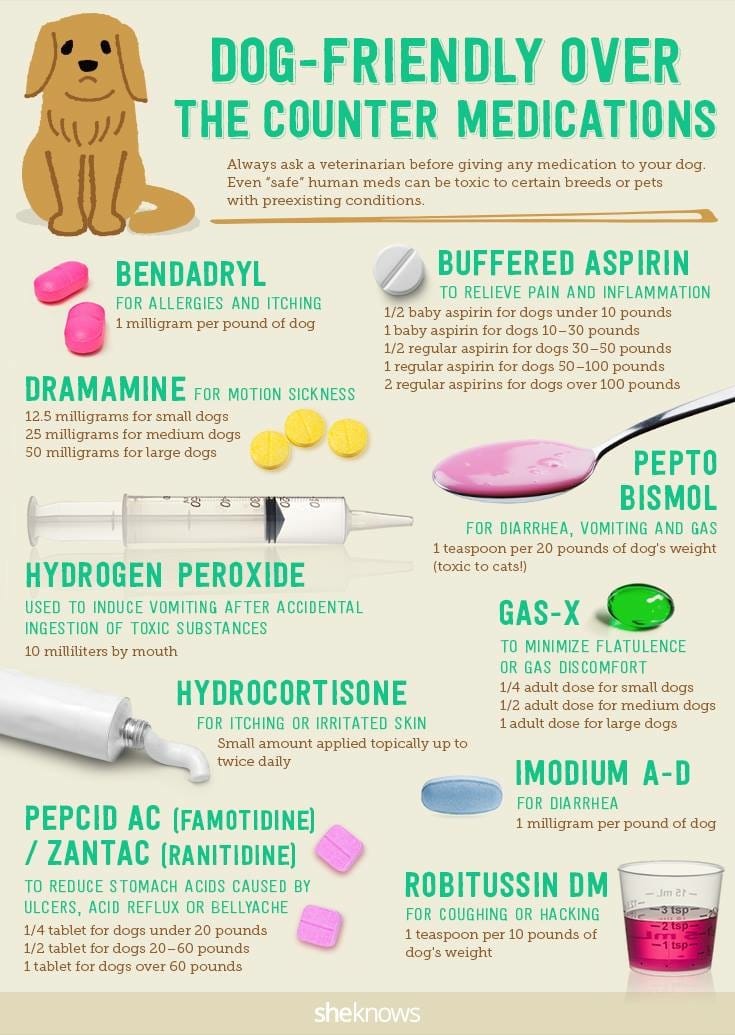As devoted pet owners, it’s natural to consider our dogs as family members, sometimes even extending this to how we manage their health. However, it’s crucial to understand that dogs are physiologically different from humans, and medications safe for us may not be safe for them. While veterinarians sometimes prescribe human medications for canine use, significant differences exist in drug tolerances, potential side effects, dosage ranges, and application methods. This article delves into the complexities of administering human over-the-counter (OTC) medications to dogs, emphasizing the importance of veterinary consultation.
The practice of giving your dog an OTC medication without consulting a veterinarian can lead to unintended harm, potentially worsening an existing health condition or causing new problems. Even common medications that seem benign can have adverse effects or interact negatively with your dog’s specific health status. Always consult your veterinarian before administering any human medication to your dog. This is not merely an inconvenience; it’s a critical step in ensuring your pet’s safety and well-being.
Understanding the Risks of Human OTC Medications for Dogs
While the instinct to provide immediate relief for a sick or injured pet is understandable, many human OTC medications pose significant risks to dogs. The chemical makeup and metabolic pathways in dogs differ from humans, leading to unpredictable reactions.
Pain Medications: A High-Risk Category
Pain relievers are among the most frequently administered human medications to pets, yet they are also some of the most dangerous.
Acetaminophen (Tylenol/Excedrin)
Acetaminophen, commonly found in Tylenol and Excedrin, can cause severe liver damage in dogs. Furthermore, it impairs the ability of red blood cells to transport oxygen, leading to a condition known as methemoglobinemia. Many human acetaminophen products are also combined with other medications, such as allergy drugs, which may be toxic to dogs.
NSAIDs (Ibuprofen, Advil, Aspirin, Motrin)
Non-steroidal anti-inflammatory drugs (NSAIDs) like ibuprofen, Advil, aspirin, and Motrin can lead to serious gastrointestinal issues in dogs, including stomach ulcers that manifest as bloody vomit and stool. These medications can also cause liver and kidney failure and, in severe cases, seizures. Administering human NSAIDs before consulting a vet can also complicate future veterinary treatment options and increase the risk of overdose and potentially fatal side effects.
Veterinary-Prescribed Pain Relief
Veterinarians have access to canine-approved NSAIDs, gabapentin, and certain opioids that are specifically formulated and dosed for dogs. Canine NSAIDs, such as carprofen, meloxicam, and firocoxib, are frequently prescribed for chronic pain associated with osteoarthritis and post-operative pain. While these are generally safe when prescribed, they carry risks for dogs with pre-existing liver or kidney conditions.
Joint supplements containing glucosamine, chondroitin, and MSM are often recommended alongside NSAIDs for arthritis management. Gabapentin is another common prescription for neuropathic pain, particularly for back injuries, and can be a safer alternative for dogs with kidney or liver issues. Opioids like tramadol and buprenorphine may also be prescribed for home use in specific pain management scenarios.
Allergy Medications for Dogs
Antihistamines are commonly considered for dogs experiencing allergic reactions. However, veterinary guidance is essential.
Diphenhydramine (Benadryl)
While generally safe for dogs, diphenhydramine can cause drowsiness. It should be used with caution in pregnant dogs or those with low blood pressure or glaucoma. Always check the ingredients, as some Benadryl products contain acetaminophen.
Cetirizine (Zyrtec) and Loratadine (Claritin)
These antihistamines are usually well-tolerated but can cause vomiting, excessive drooling, or sedation. Dogs with liver or kidney disease should not receive these medications without veterinary approval.
Topical Treatments and Vomiting Medications
Topical Antibiotics
OTC antibiotic ointments like Neosporin can be used for minor cuts and scrapes, but it’s crucial to prevent your dog from ingesting the ointment. Antiseptic sprays, such as Vetricyn, may be a more tolerable option. However, any signs of infection require professional veterinary care and potentially oral antibiotics.
Anti-Nausea and Anti-Vomiting Medications
There are no safe OTC anti-nausea or anti-vomiting medications for dogs. These medications can mask serious underlying conditions like foreign body ingestion or intestinal obstructions, delaying critical diagnosis and treatment. Even seemingly harmless options like Pepto-Bismol can pose risks if aspirated into the lungs during vomiting or interfere with diagnostic imaging. Veterinary-prescribed anti-emetics, such as Cerenia or ondansetron, are the only safe options.
Cough Medicines and Antacids
Cough Medications
Chronic coughing in dogs is a serious symptom that requires veterinary attention to diagnose and treat underlying causes like heartworm disease, kennel cough, or congestive heart failure. Human cough medications should never be administered due to potentially toxic ingredients like xylitol or acetaminophen.
Antacids
Antacids such as famotidine (Pepcid) and omeprazole (Prilosec) can be recommended by veterinarians for gastrointestinal ulceration, especially when a dog is on steroid medication. However, their long-term effects are still under study, and they should only be used under veterinary supervision.
Constipation Relief
MiraLAX (unflavored) can be used for constipation in dogs, but correct dosage is critical to avoid gastrointestinal upset. Always consult your veterinarian before administering MiraLAX to ensure appropriate dosing and to rule out more serious underlying causes of constipation.
Disclaimer: If you have any concerns about dosing and ingestion of human medications in pets, or if your pet is experiencing adverse side effects, please contact your veterinarian or an emergency veterinarian immediately. You can also call the Pet Poison Hotline at (855) 764-7661.

